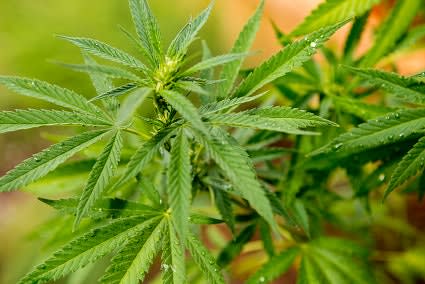For the fourth consecutive time, the Drug Enforcement Administration has denied a petition to lessen federal restrictions on the use of marijuana.
DEA Says "No" to Loosening Marijuana Restrictions
The gap between permissive state laws and a restrictive federal policy has become increasingly untenable in the minds of many doctors, patients, researchers, business owners, and legislators.

While recreational marijuana use is legal in four states and D.C., and medical applications of the drug have been approved in many more, under federal law, it remains a Schedule 1 controlled substance, which means it's considered to have "no currently accepted medical use" and a "high potential for abuse."
The gap between permissive state laws and a restrictive federal policy has become increasingly untenable in the minds of many doctors, patients, researchers, business owners, and legislators, the Washington Post reports.
For instance, last fall, a Brookings Institution report slammed the federal government for "stifling medical research" in the area of marijuana policy. As a Schedule 1 drug, it's much harder for researchers to work with marijuana than with many other controlled substances. The American Academy of Pediatrics has called on the government to move marijuana into Schedule 2 to facilitate more research into medical uses.
The current federal status of marijuana also makes it impossible for state-legal marijuana businesses to take the same tax deductions afforded to other business, with some marijuana operations complaining that their effective tax rates are in the range of 60 percent to 90 percent, according to a Denver accountant who works with such businesses, Jordan Cornelius. Federal restrictions also make banks reluctant to work with marijuana businesses, leading many of them to become all-cash operations — with all the risks that entails.
Despite these concerns, the DEA today denied the petition, initiated by then-governors Lincoln Chafee of Rhode Island and Christine Gregoire of Washington state in 2011, to loosen restrictions on the drug. In a letter to the petitioners, acting DEA Administrator Chuck Rosenberg explained the agency's ruling and offered a full-throated defense of federal marijuana policy.
Rosenberg said according to the Food and Drug Administration, marijuana "does not have a currently accepted medical use in treatment in the United States."
More Patrol

Garmont Tactical’s LE Boot Lineup
In this video, we get a look at the latest law enforcement boots from Garmont Tactical, both for men and women. Kyle Ferdyn, sales manager, showcases four of the latest boots.
Read More →
Avon Protection Launches EXOSKIN-S2 High-Performance CBRN Protective Suit
With the commercial availability of Avon Protection’s EXOSKIN-S2, users now have increased options for their protective suit requirements across the spectrum of CBRN threat environments.
Read More →
Versaterm Acquires Aloft to Unlock a New Era of Drones for Public Safety
Versaterm has acquired Aloft, an FAA-approved Unmanned Service Supplier (USS) that specializes in real-time airspace intelligence and flight authorizations.
Read More →
Versaterm Launches Innovation Summit for Public Safety Drone Operations
The two-day DroneSense Innovation Summit by Versaterm will bring together public safety and industry experts to define best practices for scaling drone operations.
Read More →
What Makes a Good LE Boot?
Learn what makes a boot good for police officers as POLICE visits with Kyle Ferdyn, of Garmont Tactical, who explains the features of boots and why each is needed in an LE boot.
Read More →
Folds of Honor Opens Scholarship Application for Children and Spouses of Fallen or Disabled Service Members and First Responders
The application period for the Folds of Honor scholarship program is now open through the end of March. Scholarships support students from early education through postsecondary studies, easing the financial burden for families who have given so much in service to others.
Read More →
Team Wendy Now on GovX: Faster Verification and Discount Access for Eligible Professionals
With GovX verification now integrated directly into the Team Wendy checkout experience, eligible customers can confirm their status in just a few clicks and have the discount applied automatically.
Read More →
5.11 Debuts 2026 Footwear & Apparel at SHOT Show
5.11 showcased new apparel and footwear products during SHOT Show 2026, including new color options for the A/T Boa Lite Mid Boot and the Founder’s Jacket.
Read More →
5.11 Debuts New Load-Bearing Gear at SHOT Show
5.11 launched a variety of new load-bearing gear, ranging from backpacks to chest packs, designed for training, travel, and everyday readiness, this week during SHOT Show 2026.
Read More →
Streamlight Launches the Rechargeable TLR-3X & Other Lights at SHOT Show
Streamlight launched the TLR-3X and TLR-3X USB, two new weapon lights, and an assortment of other new lights during SHOT Show 2026.
Read More →
